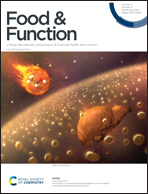Green tea polyphenol epigallocatechin-3-gallate alleviates nonalcoholic fatty liver disease and ameliorates intestinal immunity in mice fed a high-fat diet†
Abstract
Green tea polyphenol epigallocatechin-3-gallate (EGCG) may help prevent metabolic syndrome and nonalcoholic fatty liver disease (NAFLD). However, the underlying mechanisms of its protective effects are complicated and remain unclear. With the gut–liver axis theory as a foundation, the present study investigated the effects of EGCG on intestinal mucosal immunity in male C57BL/6 mice fed a high-fat Western diet or the diet supplemented with 0.4% dietary EGCG (w/w) for 14 weeks. Dietary EGCG supplementation effectively prevented changes—including excessive accumulation of visceral and hepatic fat, abnormal liver function, and elevated concentrations of serum and liver inflammatory cytokines—known to be caused by high-fat diets. In addition, serum lipopolysaccharide concentrations decreased by 94.3%. RNA sequencing data of differentially expressed genes in ileal samples among three groups indicated that most of the pathways in the Kyoto Encyclopedia of Genes and Genomes in the first 20 enrichment levels were related to immunity and inflammatory reactions. Real-time reverse transcription quantitative polymerase chain reaction was used to determine alterations in expression levels of key genes related to intestinal immune function and inflammatory responses from ileal and colonic samples. Changes in secretory immunoglobulin A in the small intestine, serum, and feces further demonstrated improved intestinal mucosal immunity in the EGCG-treated mice. In conclusion, dietary EGCG effectively prevented the development of NAFLD and significantly improved intestinal mucosal immunity in mice with obesity induced by a high-fat diet. However, whether improved intestinal immune function is the key mechanism underlying the health benefits of dietary EGCG warrants further research.



 Please wait while we load your content...
Please wait while we load your content...